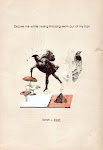My highlighting system went wooey when I tried to implement it this year, with worrying about what I was highlighting and why, etc., so if you're interested in what I thought about any of these titles, I suggest you join me at Good Reads. I've given a lot of them more time there.
1. Apocalypse Theory: A Reader by Kristy Bowen (Jan 4)
2. The Pickwick Papers by Charles Dickens (Jan 26)
3. The Orphan Master’s Son by Adam Johnson (Feb 8)
4. My Struggle by Karl Ove Knausgaard (Feb 18)
5. The Book of Beginnings and Endings by Jenny Boully (Mar 5)
6. All Quiet on the Western Front by Erich Marie Remarque (Mar 22)
7. Dick Wad by Deena November (Mar 22)
8. The Luminaries by Eleanor Catton (Mar 3)
9. Sum of Every Lost Ship by Allison Titus (April 6)
10. Trench Talk by Julian Walker and Peter Doyle (April)
11. The Siege of Krishnapur by J.G. Farrell (April 24)
12. let us now praise the empty parking lot by Jason Heroux (April 27)
13. The Son by Philipp Meyer (May 10)
14. The Hare with Amber Eyes by Edmund de Waal (May 27)
15. The Sick Rose by Richard Barnett (May 29)
16. Ah Xian Skulpturen/Sculpture by Dieter Brunner (Jun 3)
17. The Tenant of Wildfell Hall by Anne Brontë (Jun 6)
18. Smoke and Mirrors by Toni Clark (Jun 8)
19. Sea/Words by Crystal Gibbons (Jun)
20. A Wicked Apple by Susan Slaverio (Jun 8)
21. The Grotesque by Philip Thomson (Jun 8)
2. The Pickwick Papers by Charles Dickens (Jan 26)
3. The Orphan Master’s Son by Adam Johnson (Feb 8)
4. My Struggle by Karl Ove Knausgaard (Feb 18)
5. The Book of Beginnings and Endings by Jenny Boully (Mar 5)
6. All Quiet on the Western Front by Erich Marie Remarque (Mar 22)
7. Dick Wad by Deena November (Mar 22)
8. The Luminaries by Eleanor Catton (Mar 3)
9. Sum of Every Lost Ship by Allison Titus (April 6)
10. Trench Talk by Julian Walker and Peter Doyle (April)
11. The Siege of Krishnapur by J.G. Farrell (April 24)
12. let us now praise the empty parking lot by Jason Heroux (April 27)
13. The Son by Philipp Meyer (May 10)
14. The Hare with Amber Eyes by Edmund de Waal (May 27)
15. The Sick Rose by Richard Barnett (May 29)
16. Ah Xian Skulpturen/Sculpture by Dieter Brunner (Jun 3)
17. The Tenant of Wildfell Hall by Anne Brontë (Jun 6)
18. Smoke and Mirrors by Toni Clark (Jun 8)
19. Sea/Words by Crystal Gibbons (Jun)
20. A Wicked Apple by Susan Slaverio (Jun 8)
21. The Grotesque by Philip Thomson (Jun 8)
22. Art & Love: An Illustrated Anthology of Poetry, ed. Kate Farrell (Jun 9)
23. Lifeboat by Charlotte Rogan (Jun 11)
24. Everything, Vol. 1 by Lynda Barry (Jun 11)
25. Extraordinary Power by Emily Bludworth de Barrios (Jun 15)
26. The World of the Brontës by Jane O’Neill (Jun 16)
27. The Brontës, ed. Harold Bloom (Jun 17)
28. Imago by Lindsay Lusby (Jun)
29. Tiny Beautiful Things: Advice from Dear Sugar by Cheryl Strayed (Jun 18)
30. The Best American Crime Writing, Otto Penzler, ed. (Jun 19)
31. Seriously Funny: Poems about Love, Death, Religion, etc., ed. Hamby & Kirby. (July)
32. Orlando by Virginia Woolf (July 10)
33. Someone Else’s Wedding Vows by Bianca Stone (July 11)
34. Unless by Carol Shields (July 23)
35. Villette by Charlotte Brontë (July 29)
36. Kaputt by Curzio Malaparte (Aug 17)
37. The Swimming Pool Library by Alan Hollinghurst (Sept 13)
38. Heat Wave by Penelope Lively (Sept 18)
39. The Day of the Owl by Leonardo Sciascia (Sept 27)
40. Can’t and Won’t by Lydia Davis (Oct 7)
41. Stitches by David Small (Oct 20)
42. Sorted Books by Nina Katchadourian (Oct 24)
43. The Death of Sigmund Freud by Mark Edmundson (Oct 28)
44. A Girl Named Zippy by Haven Kimmel (Oct 28)
45. Can’t We Talk About Something More Pleasant by Roz Chast (Oct 29)
46. The World in Place of Itself by Bill Rasmovicz (Oct 31)
47. A Tale of Two Cities by Charles Dickens (Nov 4)
48. Sidetracked by Henning Mankell (Nov 14)
49. Cut & Paste: 21st Century Collage by Richard Brereton (Nov 16)
50. Moon Tiger by Penelope Lively (Nov 19)
51. Dogfight at the Pentagon WSJ (Nov 24)
52. Mörder ohne Gesicht by Henning Mankell (Dec 17)
53. Incident Reports by Caitlin Thomson (Dec 24)
54. Baby-Doll Under Ice by Katie Jean Shinkle (Dec 27)
55. Zoonosis by Kelly Boyker (Dec 27)
56. Swann’s Way by Marcel Proust (Dec 28)
23. Lifeboat by Charlotte Rogan (Jun 11)
24. Everything, Vol. 1 by Lynda Barry (Jun 11)
25. Extraordinary Power by Emily Bludworth de Barrios (Jun 15)
26. The World of the Brontës by Jane O’Neill (Jun 16)
27. The Brontës, ed. Harold Bloom (Jun 17)
28. Imago by Lindsay Lusby (Jun)
29. Tiny Beautiful Things: Advice from Dear Sugar by Cheryl Strayed (Jun 18)
30. The Best American Crime Writing, Otto Penzler, ed. (Jun 19)
31. Seriously Funny: Poems about Love, Death, Religion, etc., ed. Hamby & Kirby. (July)
32. Orlando by Virginia Woolf (July 10)
33. Someone Else’s Wedding Vows by Bianca Stone (July 11)
34. Unless by Carol Shields (July 23)
35. Villette by Charlotte Brontë (July 29)
36. Kaputt by Curzio Malaparte (Aug 17)
37. The Swimming Pool Library by Alan Hollinghurst (Sept 13)
38. Heat Wave by Penelope Lively (Sept 18)
39. The Day of the Owl by Leonardo Sciascia (Sept 27)
40. Can’t and Won’t by Lydia Davis (Oct 7)
41. Stitches by David Small (Oct 20)
42. Sorted Books by Nina Katchadourian (Oct 24)
43. The Death of Sigmund Freud by Mark Edmundson (Oct 28)
44. A Girl Named Zippy by Haven Kimmel (Oct 28)
45. Can’t We Talk About Something More Pleasant by Roz Chast (Oct 29)
46. The World in Place of Itself by Bill Rasmovicz (Oct 31)
47. A Tale of Two Cities by Charles Dickens (Nov 4)
48. Sidetracked by Henning Mankell (Nov 14)
49. Cut & Paste: 21st Century Collage by Richard Brereton (Nov 16)
50. Moon Tiger by Penelope Lively (Nov 19)
51. Dogfight at the Pentagon WSJ (Nov 24)
52. Mörder ohne Gesicht by Henning Mankell (Dec 17)
53. Incident Reports by Caitlin Thomson (Dec 24)
54. Baby-Doll Under Ice by Katie Jean Shinkle (Dec 27)
55. Zoonosis by Kelly Boyker (Dec 27)
56. Swann’s Way by Marcel Proust (Dec 28)






